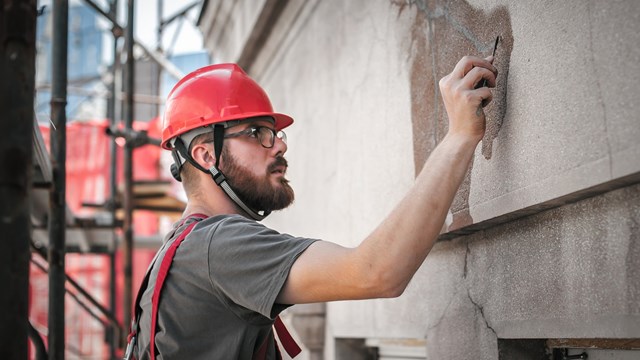Warranties for products are simple to understand, most people might think. You go to the store, buy a computer or a DVD player or a TV, or even a larger appliance like a refrigerator, and you get a piece of paper describing a one-year or two-year warranty, and what’s covered. Sometimes, for some extra money, you can get an extended warranty for another year or so.
But what if the item in question is not a personal appliance, but a huge building component that you’re purchasing in large numbers from a contractor? What if you’re purchasing, for your co-op or condo, a roof tank, pumps, a new roof, a new series of convectors for a central HVAC system, or mechanical parts for an elevator?
More Complex
Surely, the technology in items like these is more complex than your laptop. Also, in addition to the manufacturer, there is usually now a third party—the contractor. Still, a warranty must be given. How do warranties work for such large items, and what do you, as a co-op or condo board member, committee member or manager, need to know?
A Matter of Scale
Joseph Hansen, president of Boiler Pros of Chicago, an Oak Park-based company that specializes in the installation of residential and commercial hot water and steam boiler systems throughout the region says that one difference between the warranties on small personal items like an in-unit washer/dryer versus much bigger components like a commercial grade boiler system is that a significant part of the warranty on a bigger component is based on proper installation.
“If you buy a computer or a TV, the manufacturer is going to warranty that for the year, because there’s not much chance for a user-caused problem with installation,” he says. “With something like a boiler, the manufacturer will come in and look at the installation, because the majority of problems with something like a boiler or a HVAC chiller are brought on by the crew themselves during installation.”
Dennis Fiddick, an account manager and a licensed plumber with the Plainfield-based company DRF Trusted Property Solutions, a maintenance and installations provider specializing in property services for residential and commercial customers, concurs. “You have to have a qualified installer,” he says. “The biggest reason a manufacturer won’t warranty their product is because as soon as they see how it was installed, they’ll say ‘it wasn’t installed properly’ and that voids the warranty. It’s almost automatic coming out of a manufacturer’s mouth ‘was it properly installed?’ and there’s a lot of validity in that. Usually it’s not their product [that's problematic]—usually it wasn’t installed properly.”
“When it comes to warranties on major pieces of equipment it all depends on the system components,” says Martin Arteaga, president of Chicagoland Construction and Property Services, Inc. a general contractor and HVAC professional that specializes in green buildings and products. “One system component could have a five-year warranty, and other components of that same system could have 20-year warranties. So you really have to know what the warranty entails and how it’s divided. That usually causes a lot of the confusion for the customer.”
Installers and Manufacturers
How do the manufacturers’ warranties fit with installers’ coverage of their work when it comes to big-ticket items? It often depends on what type of item you’re talking about, and what manufacturer is involved.
“Every so often I’ll do installation for one of the biggest boiler manufacturers in the country,” says Hansen. “They will call me in when one of their boilers was installed incorrectly by a contractor, and the contractor is not willing to remedy the problem. So I will come in and install it properly. When a new boiler is put in there are probably 100 different steps to follow for a proper installation. On the other hand, if there is something such as a faulty ignition control on a boiler or if there is a crack in the cast iron heat exchanger, there is no one to blame but the manufacturer. In a case like that I’d call the manufacturer and say ‘your heat exchanger cracked on us,’ and they’d send someone down to the job site and have a look. When it comes to warranties every contractor is different and every manufacturer is different, you just have to check. The manufacturer I work with is very good about standing behind their warranties even if there was a minor installation error. They will still warranty it.”
According to Arteaga, installers generally provide a one-year warranty on labor. “Once the item is installed, say for a heating or cooling system, that’s when the warranty begins,” he says. “If heat is escaping or the air-conditioner is not getting cool, or if there is a loose part because of an improper installation that would be covered under the warranty. That is expected of any installer, anybody who doesn’t take care of something like that isn’t a professional.”
“When you get a boiler installed you’re going to have two warranties,” explains Hansen. “You’re going to have a manufacturer's warranty written on the product that’s typically a 10-year warranty. And then the installers will have their warranty. That warranty is for the labor, piping, valves, pumps and all the extra stuff that goes onto the boiler.” Hansen says that the second warranty typically covers the first year after installation, though some installers offer longer coverage for residential clients.
Can one purchase extended warranties on building components? Yes, they can, but they seem less popular than they do in the consumer electronics field. “I personally don’t think extended warranties are worth it,” says Hansen. “I think the best warranty a customer can get is a thorough maintenance program with a contractor who they can build a relationship with.”
Hansen also says that many contractors will put together a customized warranty for their clients that could include a heating and cooling system as well as a roof, and depending on your needs, could be worth exploring.
“My concern about extended warranties is that generally those things come with specific contractors who will do the work,” says Fiddick, “Generally the customer doesn’t get to choose the firm that will do the work. You choose from a list—it's like an HMO.” And that leads us to another question—how does this contractor’s quality affect the warranty? As Fiddick says, “It’s all connected.”
Negotiating With Boards and Managers
Unlike, say, when you buy a DVD player, buying a new boiler or convector system is a huge responsibility, and several people in a residential building making such a purchase have to examine the particulars and then sign off on it.
Often, the contractor negotiates with the manager, and then the board approves the manager’s recommendation. “Property managers or whoever is handling the day-to-day duties usually handles warranty information,” says Arteaga. “It’s important to fully understand warranty information and catalog it in your files. All systems will fail at some point, and if it fails during the warranty period you’ll have coverage.” On other occasions, however, the contractor negotiates with the board as well as the manager.
Clearly, every building or building complex is different. Some boards are very hands-on, while others leave everything to the manager. In some buildings, an engineer or architect hired by the co-op or condo also takes part in the business-making process. There are even some boards that have members who are in the construction trade and in these cases, contractors feel comfortable talking about warranties and other matters with those professionals.
Parts and Labor?
Finally, do most companies that manufacture building components and the contractors and dealers who sell them, offer parts-and-labor warranties, or only warranties on parts?
“A service warranty to me is a preventative maintenance warranty of some type where you’re doing the standard maintenance that’s required by the manufacturer to insure proper maintenance of the equipment,” says Fiddick. “For example, for a boiler system there are a few things that would be included. Filter replacements, lubrication, small items that would be standard maintenance things that are required, special types of cleaners that are recommended by the manufacturer. Every system is different and unique.”
There are critical questions to ask about warranties on major building components. First, it is vital for associations to know who backs the warranty – whether it’s the manufacturer, the contractor or supplier or a third party and to understand what it covered and what’s not.
Clearly, contractor- and dealer-offered warranties for major building components are a complicated subject. Thankfully, you as a condo board member have many resources to rely on—the experience of board members and managers of other developments, members of your own board who might be architects, engineers or construction professionals, co-op and condo trade organizations, and, of course, your manager.
Raanan Geberer is a freelance writer and a frequent contributor to The Chicagoland Cooperator.







Leave a Comment